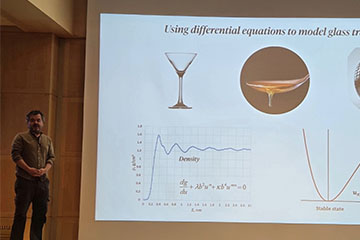CMU’s Commitment to Free Expression and Free Speech
Updated policies and webpage improve searchability
As a public institution of higher education, Central Michigan University aims to be both a marketplace for the free and open exchange of ideas and a community that fosters an environment conducive to teaching, learning and research.
That’s the message behind CMU’s Commitment to Free Expression and Free Speech, outlined on a recently published page of the university’s website, and the rationale behind updates to the university’s Expressive Activity and Advocacy Policy, formerly called the Advocacy Policy.
The right to explore and exchange ideas
CMU students are known for their civic engagement, with voting rates well above the national average. They also engage in the community though hundreds of student organizations, many aligned with social causes, nonprofit organizations and political groups.
The university’s updated Expressive Activity and Advocacy Policy provides clearer contact information, updated definitions, and guidance for a variety of forms of advocating for causes, including posting signs, distributing printed materials, reserving space for gatherings, and more.
Faculty and staff also regularly engage students in discussion of challenging and sensitive topics, creating space for the exchange of ideas and opinions; these have included programs such as Conversations that Matter, Critical Engagements, Soup and Substance, and courses offered through the Institute for Transformative Dialogue.
CMU President Bob Davies said the university will monitor its effectiveness and usefulness to the university community throughout the year.
“We encourage our students, faculty and staff to review the policy and to share their experiences working with it,” Davies said.
An online feedback form is available on the Expressive Activity and Advocacy Policy webpage.
Policy review and updates
John Danner, CMU’s general counsel, said CMU regularly reviews and updates administrative policies and procedures to ensure they are relevant, appropriate and effective for the campus.
CMU recently reviewed several policies, including the Sexual and Gender-Based Misconduct Policy, the former Advocacy Policy, Workplace Violence Policy and several others. Some are still being reviewed and revised, Danner said.
Mary Martinez, Assistant to the President for Institutional Equity and Title IX Coordinator at CMU, said recent Title IX changes necessitated updates to the Sexual and Gender-Based Misconduct Policy. However, pending legislation involving Title IX may require additional changes to be made, she said.
Members of the university community can review all CMU’s administrative policies on the newly updated webpage. Anyone can share thoughts and suggestions on the Sexual and Gender-Based Misconduct Policy using an online feedback form, and on the Expressive Activity and Advocacy Policy using an online feedback form.
Making policies more accessible
Over the summer, CMU’s University Communications and General Counsel partnered to reshape the way the university community searched for and explored administrative policies.
“Previously, all policies were posted to the website as PDF documents, which did not always pull easily into searches of the website,” said John Veilleux, vice president of university communications. “By rebuilding each policy as a standalone webpage, we were able to improve search engine optimization using keywords, headings and more.”
On the new Administrative Policies, Procedures and Guidelines page, community members can more easily search for and find relevant policies, and individuals who use the search bar on the home page will also more quickly find the necessary content, Veilleux said.




